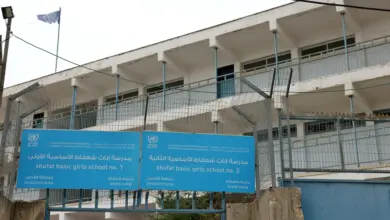Sirte, Libya–Arab leaders failed at their summit on Sunday to reach a consensus on whether the Palestinians should resume stalled peace talks with Israel.
The Arab League scheduled an extraordinary summit next September to tackle issues it had been unable to resolve during its two days of meetings in the Libyan coastal city of Sirte.
The Palestinians have said indirect talks with the Israelis will not take place unless Israel cancels a decision to build 1,600 new homes in a settlement near east Jerusalem, dealing a fresh blow to an already troubled Middle East peace process.
The Arab League had given its blessing to the Palestinians, before the Israeli decision was announced, to conduct the so-called proximity talks with Israel, so the organization’s stance now on whether those negotiations should still go ahead is potentially decisive.
After two days of talks in the Libyan town of Sirte, a committee of foreign ministers from some member states produced a resolution saying that a halt to all settlement activity was necessary for Israeli-Palestinian negotiations to go ahead.
But that decision was not adopted by the full summit and, in a sign of the lack of consensus, Syria’s foreign minister said his country would not recognize the document as representing the view of the Arab League.
Arab League Secretary-General Amr Moussa said after the summit ended that another, extraordinary meeting of heads of state would take place to deal with outstanding issues.
He acknowledged the urgency of taking a collective decision on the Israeli-Palestinian talks.
"Within the next few weeks we have to decide what to do, whether to continue with the negotiations or to completely shift course," he told a news conference.
Arab leaders, however, said in their final declaration that all Israeli measures and practices which seek to alter the features of occupied Jerusalem and its demographic, humanitarian and historic situation are “invalid and cannot be accepted”.
The declaration appeals for the international community, particularly the UN Security Council, the European Union and UN Education, Science and Culture Organization (UNESCO) to take responsibility in saving East Jerusalem and maintaining the al- Aqsa Mosque.
It also call on the Arab group in New York to request convening a special session of the UN General Assembly to stop all Israeli measures in Jerusalem that are in violation of the international law.
The declaration mandates forming a legal committee within the framework of the Arab League to follow up ‘Judaization’ of East Jerusalem and the conversion and confiscation of Arab property and to raise the issues before the national and international courts with jurisdiction to prosecute Israel legally.
According to Arab diplomats, Syria and Libya teamed up Sunday to pressure the Palestinian leader to quit peace talks with Israel and return to ‘armed resistence’.
An adviser to the US-backed Palestinian president, Mahmoud Abbas, quickly rejected the suggestion, calling for the 22 nations represented at the gathering to be "realistic."
The calls to abandon the effort reflected the depth of frustration and anger over the stalled peace process and continued Israeli construction in areas claimed by the Palestinians, particularly east Jerusalem.
Syrian President Bashar Assad urged Abbas to withdraw from a US-supported peace strategy and resume armed resistance to Israel, according to two delegates who spoke with the Associated Press on condition of anonymity.
They said Assad also urged Arab countries to halt any contacts with Israel, though only Egypt and Jordan have peace deals with the Jewish state.
"The price of resistance is not higher than the price of peace," one delegate quoted Assad as telling Abbas.
Summit host Moammar Gadhafi of Libya warned that his nation will withdraw support for an initiative launched at a 2002 Arab League summit in Beirut calling for exchanging land for peace with Israel, the delegates said.
Senior Abbas aide Nabil Abu Rdeneh dismissed the pressure.
"Let us be realistic. We will not follow those who have special agendas," he told Al-Jazeera television.
"We are ready for any Arab option. If they want to go to war let them declare that and mobilize their armies and their people and we will follow suit," Abu Rdeneh said.
Earlier this month, Arab nations opened the door for Abbas to enter four months of indirect, American-brokered peace talks with Israel. But they later threatened to withdraw support for the negotiations after Israel announced plans for new Jewish homes in east Jerusalem, the part of the city Palestinians claim as the capital of a future state.
Speaking at the summit Saturday, Abbas urged Mideast peace brokers to push Israel to stop settlement construction, and he vowed that the Palestinians will not sign any peace deal with Israel without the Jewish state ending its "occupation" of east Jerusalem.
He accused Israeli Prime Minster Benjamin Netanyahu’s government of trying to create a de facto situation in Jerusalem that would torpedo any future peace settlement.
The Palestinians are also asking Arab nations for millions of dollars in funding for Palestinians living in east Jerusalem.
Moussa urged leaders at the opening of the summit to create a new strategy to pressure Israel and stressed the peace process cannot be "open ended."
The summit registered a higher than usual number of no-shows from Arab leaders. Eight heads of state stayed away, including Egyptian President Hosni Mubarak and King Abdullah of Saudi Arabia.
Recent Arab summits have been marred by disagreements among Arab leaders, divided between pro-Western rulers and more radical regimes. The divisions tend to water down joint Arab positions.




